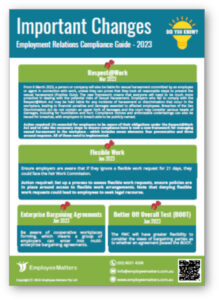Update: Download the free guide!
Click here to download the 2023 Employee Relations Compliance Guide:

A new government, particularly when it’s a change in government, usually brings changes in the landscape of employment law. After nine years of Coalition government, it is no surprise that the first months of the new Labor government have seen a number of significant changes.
Let's look at these changes and how they may affect your organisation.
Pay Secrecy
In December 2022 new rules came to prohibit the ongoing use of pay secrecy clauses. In summary:
- Employees have the right to
1. share or not share information about their pay
2. share or not share information related to working out their pay e.g. hours of work
3. ask other employees (with the same or different employer) about their pay or information needed to work it out
- Employers can’t take adverse action around exercising such rights
- From 7 June 2023 pay secrecy terms in new contracts can’t be used for any contract entered into from 7 December 2022
- Existing terms can no longer be enforced
Job Ads
It is now unlawful to advertise a rate of pay that is below the legally required minimum rate. While it has always been unlawful to pay below the legal minimum as stated in the national Employment Standards, Award and Enterprise Agreements, up to now there has been no regulation about what rates are advertised.
This means for instance, the Award coverage and classification process needs to be undertaken prior to advertising the wages for a role.
Protected Attributes
Three new ‘protected attributes’ have been added to the list in the Fair Work Act in addition to existing ones such as sex, race, age, disability, religious beliefs etc. The three newly added to the list are:
- Breastfeeding
- Intersex status
- Gender identity
These items were already included in the Sex Discrimination legislation but this change allows for easier access to complaints processes via the Fair Work Commission.
Flexible Work
The Fair Work Act has for a long time contained requirements around ensuring employers consider flexible work requests from employees, prior to making a decision on whether to grant the request.
From June 2023, the scope of who can make flexible work requests has been extended to include pregnant employees and those at risk of family and domestic violence.
In addition the requirements about how employers respond to these requests and importantly, the right for employees to go to Fair Work to dispute a refusal or delay in a response from the employer.
Family and Domestic Violence Leave
From 1 February 2023 (1 August if you employ less than 15 people) there are entitlements via the National Employment Standards (i.e not just Award employees) for 10 days paid Family and Domestic Violence leave.
The entitlement is for 10 days in a 12 month period and is not prorated for part time and casual employees.
It is important to ensure you update your leave policies to reflect this change.
Respect@Work
While all good businesses have been mindful of the need for gender equality and managing sexual harassment issues robustly and sensitively, the acceptance by the government of the Respect@Work report is creating a requirement for a much more proactive approach in this area.
From March 2023:
A person or company will also be liable for sexual harassment committed by an employee or agent in connection with work, unless they can prove that they took all reasonable steps to prevent the sexual harassment.
A new and complex seven stage framework to manage gender equality and sexual harassment is being introduced alongside this obligation.
Fixed Term Contracts
From December 2023, employers will no longer be able to have people working on fixed term contracts of more than 2 years. This includes contract extensions taking the total term to more than two years. There will also be a requirement to issue a Fixed Term Contract Information statement which will we presume, be similar in nature to the current Fair Work information Statement for all employees and the Casual Employee Information statement for casual employees.
There will be some exceptions, but there will also be regulations in place to stop employees coming up with any ‘creative work arounds’ to avoid this rule.
Enterprise Agreements
A range of changes have been introduced from December 2022 governing the use of Enterprise Bargaining Agreements especially in the area of terminating agreements and the sunsetting of so-called ‘Zombie Agreements’.
Further changes around approving agreements,the ‘BOOT’ test, disputes and industrial action and bargaining streams will be introduced in the coming months.
Given the range and complexity of some of these changes, expert advice and guidance may be required. Click the button to book a free session with us to discuss how Employee Matters can help to alleviate your HR headaches.
